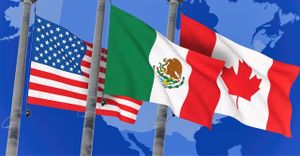The year 2024 is shaping up to be pivotal for the global economy, with countries around the world facing multifaceted challenges. From fluctuatiing stock indexes to regulatory changes, the economic forecast is clouded with uncertainties—yet the actions taken within the present year will define future conditions.
Beginning with Qatar, the country's stock index closed at 10,665.97 points, which is higher by 24.88 points, or 0.23 percent as reported by Atlas Sport on February 24, 2025. This increase reflects the fluctuative yet largely stable nature of the Qatari market, where nearly 195.02 million shares were traded, amounting to roughly 595 million Qatari rials. Notably, the market capitalization settled at about 622 billion rials, though it represented a slight decline from the previous session. This movement indicates the market is responsive yet cautious amid broader economic evaluations.
Meanwhile, the China Ministry of Ecology and Environment announced their success in achieving targets aimed at preventing air pollution throughout 2024. This success story highlights proactive governmental action but raises questions about the sustainability of such progress as industrial growth continues to demand high energy consumption. The juxtaposition of developmental needs against environmental sustainability is expected to feature prominently on the international economic agenda moving forward.
Domestically, China's efforts—focusing on tighter environmental controls—coupled with the rise of new technologies create a more competitive, yet unpredictable, economic environment. The efficacy of the overarching Ecological Civilization policy will draw considerable attention from economists and environmentalists alike. With success hailed as achieved, experts are left to ponder: is it enough to counteract the impending economic pressures?
Looking beyond national efforts, technological advancements have continued to underpin market shifts worldwide. Just this week, O.XYZ revealed the launch of their decentralized AI assistant OCEAN, which has contributed to significant developments within the digital finance sector. The overall market capitalization of stablecoins reached $217.3 billion according to DeFiLlama, illustrating the rapid growth of digital currencies and their potential to reshape traditional economic models.
Further, recent acquisitions such as oneZero's purchase of Autochartist have showcased the trend of consolidation within fintech, potentially signaling stability and growth within this segment, yet also raising concerns about monopolistic tendencies as these players grow larger.
Despite signs of growth, the banking sector is also facing challenges, especially with newly established regulations such as the MiCA license obtained by eToro. These regulations aim to establish frameworks for stability, yet they may hinder certain flexible innovation paths, creating tension between growth aspirations and regulatory compliance.
Reports from Morocco indicated rising political tension as factions within the ruling coalition began criticizing governmental performance, reflecting underlying economic discontent. Specifically, the opposition elders voiced concerns about the social and economic strain on the populace, intensifying scrutiny on the ruling party's capabilities to manage the economic fallout effectively. The instabilities could act as significant factors affecting investment opportunities if not addressed timely and strategically.
With the political situation exacerbated by critiques from opposition parties like the Independence Party and the Authenticity and Modernity Party, upcoming elections will be telling for change, progress, and sustained economic growth. These dynamics echo larger sentiments across many regions where political discourse increasingly reflects economic grievances.
Lastly, as new data continues to emerge, analysts stress the importance of focusing on realistic frameworks for economic forecasts, recognizing both the opportunities presented by innovation and the systemic risks inherent to rapid change. Knowing how variables like regulatory environments, technological adoption, and political stability interplay will be pivotal for CCW global players aiming to strategize for growth.
2024 will undoubtedly be marked as historic, not just for its economic milestones, but for the insights gleaned from how nations managed their internal and external economic landscapes amid pressing challenges. It asks governments and corporations alike to adapt continually and find balance, with the undertaking being as much about foresight as it is about action.



